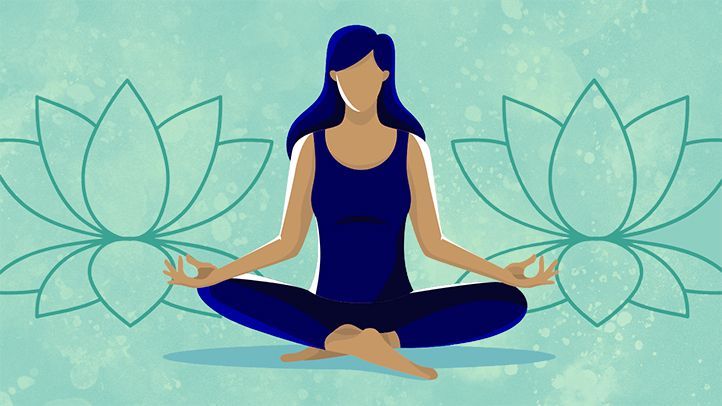Buddhists describe a “monkey mind” as a restless, uncontrollable cognitive state. You’ll often hear the phrase “calm the monkey mind” from meditators. You may have heard about the incredible and life-changing benefits of meditation. While it may sound too good to be true, many of these merits are science-based.
Our modern lifestyle necessitates us to be mindful of what our bodies need and explore various approaches to take care of our mental health. Many people turn to meditation for this purpose. If you’re feeling stressed, meditation may benefit you. Here are seven reasons you should add it to your mental health toolbox.
1. Reduce Stress and Anxiety
Meditation is a powerful mindfulness practice. People use it to ease stress and anxiety, common barriers to a healthy lifestyle.
How does meditation help with stress and anxiety? The loop of negative thoughts is often the source of stress and anxiety. Sitting down and focusing on your breath cuts the cycle of overthinking and slowly puts the mind in a relaxed state. The body follows by easing the tensed muscles.
Stress and anxiety are inevitable, especially for working women who often hold down multiple responsibilities, such as parenting, caring for an elderly family member and career. Meditation is an effective way to decompress.
2. Improve Your Focus
Our current lifestyle has created unfocused minds with shorter attention spans. If you find yourself lost in thoughts almost half of the time due to past problems and future worries, meditation may help you pull away from this debilitating mind cycle.
Any form of meditation, whether moving, concentrative or mindfulness, can help you realign with the present and live with the now. If you can harness this benefit, your attention span lengthens and you become more productive at work and build quality relationships.
3. Enhance Self-Awareness
Meditation also encourages you to delve into your inner self to know the real you. You often feel like a product of people’s expectations, your experiences and the consequences of the world around you. If you want to know your genuine self, you must look inside. Introspection will help learn your triggers, immediate reactions to stimuli and how these affect your mood — and ultimately improve your life.
Meditation will teach you to be an observer of yourself and become responsive instead of reactive to external events, such as problems at work. When you are re self-aware, you become tolerant of rejection and move on without hard feelings when people disapprove of you.
4. Cultivate Compassion for Others
The most important reason for meditation is to enrich compassion for the people around you. Compassion and mindfulness are correlated and positively influence your ethics and the role you fulfill in various settings.
Meditation teaches you to forgive the guy who stepped on your foot in a crowded subway or your colleague’s unintentional mistake at work. When you see things from their point of view, you better understand their behaviors and where they’re coming from. You start to like people more and aim to add a little value to their lives.
5. Increase Cognitive Flexibility
In addition to reducing burnout and improving mental health, one research about mindfulness in the workplace revealed that mediation can boost concentration, cognitive flexibility, work engagement and job satisfaction.
Cognitive flexibility is your brain’s ability to adapt to changing conditions or shift between multiple concepts. It’s a vital workplace ability, especially if you switch from task to task or respond to conversations between your team leader and a colleague. With mental flexibility, you can solve problems creatively.
6. Achieve a Stronger Work-Life Balance
Work-life balance usually entails setting a boundary between work and personal life by fixing your schedule. But does limiting your time at the office to eight hours automatically equate to stable work and lifestyle? Not necessarily — that’s where meditation fits in the image.
Sustaining a well-balanced work and personal life is more than just setting a schedule for everything. It’s also about being mindful about using your time. At work, you can concentrate on the most important tasks at hand when your mind is free from distractions. The outcome is that you become more productive.
In your personal time, using mindfulness to mentally focus on every interaction with family and other people leads to meaningful and rewarding experiences.
7. Feel Happier
Happiness is often elusive, but people who meditate have a better flow of positive emotions and thoughts, so they lead happier lives. Those with higher consciousness have a greater sense of purpose in life and decreased symptoms of anxiety and depression.
How does this help achieve happiness? Self-aware people may be more likely to find their purpose in life, gain awareness of what genuinely matters to them and discover significant values to organize their lives.
Start Leading a Vibrant Life With Meditation
Meditation benefits every facet of health — physical, mental, emotional, spiritual and social. It’s an effective tool to elevate your self-awareness, increase efficiency at work, hone cognitive abilities and thrive by achieving work-life balance and happiness.
Meditation will change your life for the better. It’s a safe tool you can include in your mental health kit to support your general well-being.





































